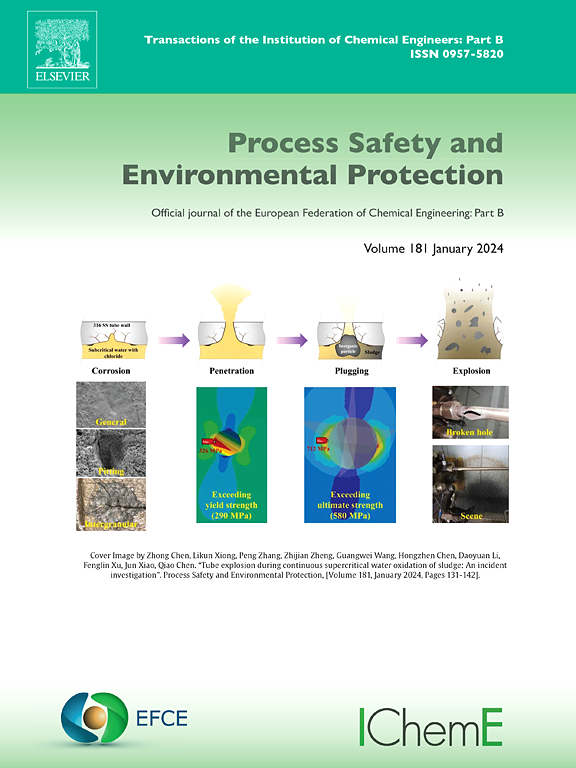Effects of water sprays on hydrogen autoignition in heated air
IF 6.9
2区 环境科学与生态学
Q1 ENGINEERING, CHEMICAL
引用次数: 0
Abstract
The effects of water mist with different diameters and mass loadings on hydrogen auto-ignition in air with elevated temperatures and pressures are studied. It is shown that smaller droplets with larger mass loading are the most effective in inhibiting the auto-ignition process. Under elevated initial pressures and temperatures, the role of water mist in impacting auto-ignition is minimal, primarily because the ignition delay is substantially shorter than the droplet evaporation duration. As the initial temperature decreases, there exists a temperature value below which water mist markedly extends the ignition delay time, even escalating it by up to two orders of magnitude or causing a complete suppression of ignition. The rate of production for important radicals was analyzed. The data indicates that the evaporation of the water mist lowers the initial temperature, leading to a reduction in the rate of the temperature-sensitive fast chain branching reaction. In contrast, the third body reaction that generates HO2 is not sensitive to temperature. Meanwhile, the introduction of H2O results in an earlier activation of the third body reactions. Consequently, the production of HO2 is enhanced, emphasizing the role of subsequent slow chain propagation reactions that generate OH, thereby extending the ignition delay. By deactivating the mass transfer between two phases and introducing artificial species, it is evident that water vapor dilution and thermal effects predominantly influence the ignition delay, while its role as a direct reactant is minimal.
水喷雾对加热空气中氢气自燃的影响
研究了不同直径和质量负荷的水雾对高温高压空气中氢气自燃的影响。结果表明,较小的水滴和较大的质量负荷能最有效地抑制自燃过程。在初始压力和温度升高的情况下,水雾对自燃的影响微乎其微,这主要是因为点火延迟时间大大短于水滴蒸发时间。随着初始温度的降低,存在一个温度值,在该温度值以下,水雾会明显延长点火延迟时间,甚至使其延长两个数量级,或导致完全抑制点火。对重要自由基的产生速率进行了分析。数据表明,水雾的蒸发降低了初始温度,导致对温度敏感的快速链式分支反应速率降低。相比之下,产生 HO2 的第三体反应对温度并不敏感。同时,引入 H2O 会导致第三体反应提前启动。因此,HO2 的产生得到了加强,从而突出了随后产生 OH 的慢链传播反应的作用,从而延长了点火延迟时间。通过使两相之间的传质失活并引入人工物种,可以看出水蒸气稀释和热效应对点火延迟产生了主要影响,而水蒸气作为直接反应物的作用则微乎其微。
本文章由计算机程序翻译,如有差异,请以英文原文为准。
求助全文
约1分钟内获得全文
求助全文
来源期刊

Process Safety and Environmental Protection
环境科学-工程:化工
CiteScore
11.40
自引率
15.40%
发文量
929
审稿时长
8.0 months
期刊介绍:
The Process Safety and Environmental Protection (PSEP) journal is a leading international publication that focuses on the publication of high-quality, original research papers in the field of engineering, specifically those related to the safety of industrial processes and environmental protection. The journal encourages submissions that present new developments in safety and environmental aspects, particularly those that show how research findings can be applied in process engineering design and practice.
PSEP is particularly interested in research that brings fresh perspectives to established engineering principles, identifies unsolved problems, or suggests directions for future research. The journal also values contributions that push the boundaries of traditional engineering and welcomes multidisciplinary papers.
PSEP's articles are abstracted and indexed by a range of databases and services, which helps to ensure that the journal's research is accessible and recognized in the academic and professional communities. These databases include ANTE, Chemical Abstracts, Chemical Hazards in Industry, Current Contents, Elsevier Engineering Information database, Pascal Francis, Web of Science, Scopus, Engineering Information Database EnCompass LIT (Elsevier), and INSPEC. This wide coverage facilitates the dissemination of the journal's content to a global audience interested in process safety and environmental engineering.
 求助内容:
求助内容: 应助结果提醒方式:
应助结果提醒方式:


